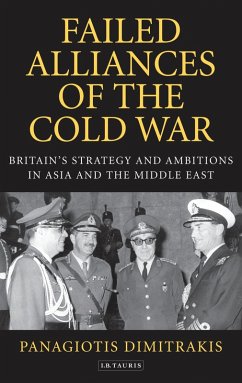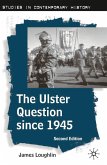The Cold War was a period of intense political rivalry, in which diplomacy and international relations in Asia and the Middle East acquired huge global significance. In this study, Panagiotis Dimitrakis explores British policy towards SEATO (South East Asia Treaty Organisation) and CENTO (Central
Treaty Organisation). Designed in the 1950s to counter the Soviet Union's attempts to expand its global influence, these alliances with Asian and Middle Eastern powers were at the centre of western efforts to maintain regional influence. Yet they failed to bring together the differing aims and ambitions
of their regional members and were dissolved in 1977 and 1979 respectively. This study examines the Cold War policies of the United States, Iran and Pakistan as well as the effect of British diplomacy on the war in Vietnam and SEATO planning.
The formation of CENTO in 1959 - an alliance comprising Britain, Iran, Turkey and Pakistan with the support of the USA - was one of the grandest Cold War gestures of solidarity. The emergence of new diplomatic records, however, questions the true commitment of Britain and the United States to come to the defence of their new allies in Asia and the Middle East. In fact, even in cases of aggression on the part of the Soviet Union, the priorities of Britain and the USA were ultimately self-serving, despite their Cold War rhetoric of ideological unity and common purpose. As the 1950s came to a close, serious irreconcilable differences in the defence policies of the SEATO and CENTO members began to emerge.
Citing the latest declassified British and American intelligence assessments, diplomats' dispatches and military plans, Dimitrakis shows how nations across South East Asia fought for material supremacy; how Britain and the United States avoided supporting SEATO and CENTO; and how détente led to the demise of these alliances.
Failed Alliances of the Cold War will be a crucial point of reference for scholars of the Cold War, and those working in the fields of History, Politics and International Relations.
Treaty Organisation). Designed in the 1950s to counter the Soviet Union's attempts to expand its global influence, these alliances with Asian and Middle Eastern powers were at the centre of western efforts to maintain regional influence. Yet they failed to bring together the differing aims and ambitions
of their regional members and were dissolved in 1977 and 1979 respectively. This study examines the Cold War policies of the United States, Iran and Pakistan as well as the effect of British diplomacy on the war in Vietnam and SEATO planning.
The formation of CENTO in 1959 - an alliance comprising Britain, Iran, Turkey and Pakistan with the support of the USA - was one of the grandest Cold War gestures of solidarity. The emergence of new diplomatic records, however, questions the true commitment of Britain and the United States to come to the defence of their new allies in Asia and the Middle East. In fact, even in cases of aggression on the part of the Soviet Union, the priorities of Britain and the USA were ultimately self-serving, despite their Cold War rhetoric of ideological unity and common purpose. As the 1950s came to a close, serious irreconcilable differences in the defence policies of the SEATO and CENTO members began to emerge.
Citing the latest declassified British and American intelligence assessments, diplomats' dispatches and military plans, Dimitrakis shows how nations across South East Asia fought for material supremacy; how Britain and the United States avoided supporting SEATO and CENTO; and how détente led to the demise of these alliances.
Failed Alliances of the Cold War will be a crucial point of reference for scholars of the Cold War, and those working in the fields of History, Politics and International Relations.









